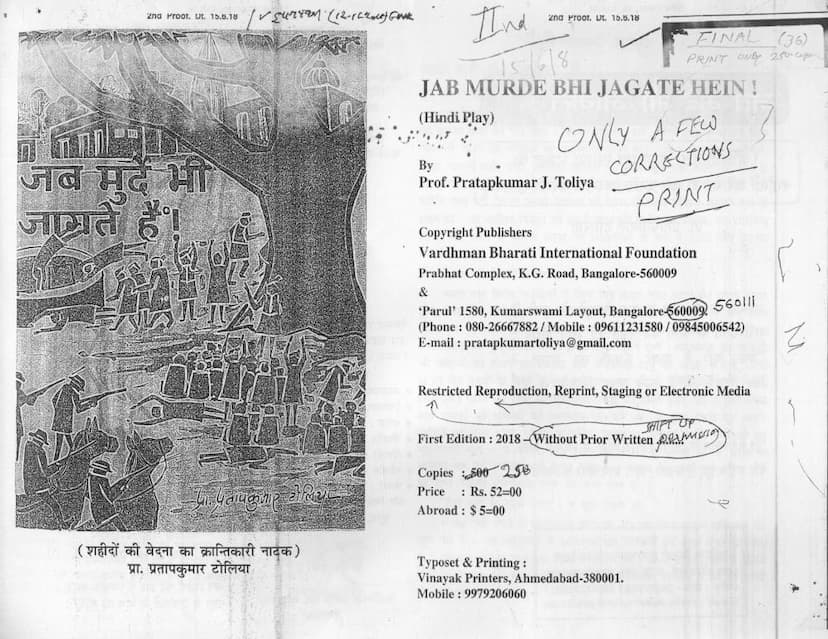Jab Murdebhi Jagte Hai
Added to library: September 1, 2025

Summary
This document is the English summary of the Hindi play "Jab Murde Bhi Jagte Hain" (When the Dead Also Awaken) by Prof. Pratapkumar J. Toliya.
Book Title: Jab Murde Bhi Jagte Hain (When the Dead Also Awaken) Author: Prof. Pratapkumar J. Toliya Publisher: Vardhman Bharati International Foundation
Summary:
"Jab Murde Bhi Jagte Hain" is a revolutionary one-act play that delves into the pain and suffering of the martyrs of Jallianwala Bagh and India as a whole. The play powerfully questions the current corrupt leadership by depicting the spirits of the martyrs awakening from their graves to ask: "Is this the India of our dreams, for which we laid down our lives?"
The play is dedicated to the author's late brother, Kirtikumar Toliya, a revolutionary and disciple of Sardar Bhagat Singh, and to all visionaries of a corruption-free, non-violent India. It was written in the immediate aftermath of his brother's passing, deeply influenced by his life of struggle and incomplete revolutionary dreams. The author sought to give expression to the profound pain he felt, drawing inspiration from the inner world of his brother and other great martyrs.
The play is presented as a "revolutionary one-act play of the pain of martyrs" and a "sentimental narrative based on the Jallianwala Bagh martyrs." It highlights the stark contrast between the sacrifices made for India's freedom and the current state of corruption, disunity, and self-interest plaguing the nation.
Key Themes and Content:
- The Jallianwala Bagh Massacre: The play opens by vividly portraying the brutality of the Jallianwala Bagh massacre on April 13, 1919, where unarmed Indian men, women, and children were shot by British forces. It emphasizes the unity and sacrifice of Indians from all communities during this event.
- Forgotten Martyrs: The play laments the nation's forgetfulness of its freedom fighters like Bhagat Singh, Chandrashekhar Azad, and Netaji Subhas Chandra Bose. It criticizes the superficial remembrance of these heroes through mere rituals and ceremonies, arguing that their true spirit and dreams are being ignored.
- Post-Independence Corruption: The core of the play's critique is directed at the current state of India. It highlights pervasive corruption, provincialism, linguistic fanaticism, casteism, selfishness, and nepotism, which have replaced the ideals of unity, tolerance, and mutual love that the martyrs fought for.
- The Protagonist's Struggle: The protagonist, Yogen, is the son of a martyr from Jallianwala Bagh. He faces immense hardship, with his mother falling ill and no one willing to help him, even by pawning his father's coat. This personal struggle mirrors the larger disillusionment and suffering of the common people.
- The Awakening of Martyrs: Driven by despair and a deep sense of injustice, Yogen visits his father's tomb. There, the spirits of the martyrs, including Karan Singh, Azad Singh, and his own father, Devi Prasad, appear. They express their sorrow and disappointment at the current state of affairs, questioning if the India they sacrificed for has come to fruition.
- The Message of Non-Violence and Love: While the play acknowledges the revolutionary fervor of the freedom struggle, it also emphasizes the ultimate message of non-violence, love, and compassion, particularly through the transformation of characters like Kirtikumar Toliya and the legacy of Mahatma Gandhi.
- Critique of Superficial Patriotism: The play satirizes those who pay lip service to patriotism and remember martyrs only during ceremonies, while their actions contradict these ideals. It shows how superficial gestures like offering flowers at tombs are meaningless if the spirit of sacrifice and service is absent.
- Call to Action and Hope: Despite the grim depiction of the present, the play ends with a message of hope. The martyrs encourage the living to awaken, to remember their sacrifices, and to work towards building a new India based on truth, labor, and self-restraint, fulfilling the dreams of a corruption-free and united nation. The play suggests that the "dead will awaken" when the "living" are truly awakened.
Production and Reception:
The play was first staged in 1960-61 and received acclaim for its powerful script and direction. It was performed in various cities across India, including Ahmedabad, Hyderabad, Madras, and Bangalore. The play was lauded for its ability to evoke strong emotions, its critical commentary on societal issues, and its patriotic fervor. The author, Prof. Toliya, is also recognized for his contributions to literature, music, and art, and the play reflects his broader vision for cultural education and the upliftment of society.
In essence, "Jab Murde Bhi Jagte Hain" is a poignant and thought-provoking drama that serves as a stark reminder of the sacrifices made for India's freedom and a powerful indictment of the societal decay that followed. It calls for a genuine awakening and a renewed commitment to the ideals of nation-building and true patriotism.